
A “ Lesson” For Itaewon Class...
Most people will probably tell you that this show is the “ most original Korean drama, they’ve ever seen” or “ the best one ever”, however, there was something about this drama which took me awhile to work out where my problem lay from a critical manner. Of course, there’s no doubt that Itaewon Class has some selling points which were tackled for the appeal of the “ young generation” and “international” viewers. This is particularly seen through; casting choices ( note fairly newcomer actors Da- Mi and American Chris Lyon) , themes tackled( attitudes to racism, LGBT rights and of course released prisoners) , fairly unique plot premise and characters as well . So, where did a show with such brimming potential go wrong? Well, its biggest problem was for once not entirely upon the acting ( this is something which I must give the show some praise for , especially from Da-Mi ‘s emotionally vibrant role as her role character Yi Seo, against lead actor Park Seo Joon’s sometimes lacklustre moments) , but, upon the characters and plot itself. The show ( based upon the titular Korean webtoon) centres around Park Sae-royi ( Park Seo Joon) who during his teen years, was wrongfully imprisoned around the same time of his father’s accident, when he is angered by bully and legitimate heir to Jangga Group, Jang Geun-won ( Ahn Bo Hyun). After being released, Sae- royi claims revenge against Jaanga Group by establishing his own restaurant in Itaewon with the help of fellow misfits , intelligent and tech savvy Jo Yi- Seo as his manager ( Kim Da- Mi), Yi- Seo’s classmate and illegitimate son of the head of Jaanga , Jang Geun-soo ( Kim Dong hee), fellow inmate Choi Seung-kwon ( Ryu Kyung-soo) transgender woman and head cook Ma Hyeon-yi( Lee Joo - Young) and Guinean- Korean part-timer Kim To- Ni ( Chris Lyon). As a premise, the show has a unique flair to it, but, I think it’s quick to become apparent that a show which focused upon the characters as plot devices rather than human beings at times, certainly has lacking emphasis upon characterisation . This cliche grew apparent when the show trickled into the tropes of revenge dramas from illnesses, illegitimate heirs to the stereotypical cliche of love scenarios between the “ older” Male lead Park Sae- royi, the “ young prodigy ,and not so innocent” Yi- Seo , the “ tangled between love and duty” Oh Soo-ah ( Kwon Nara) and the “ puppy -dog outcast” Geun- Soo. Whilst there was nothing entirely wrong with having romance in a drama about misfits, Itaewon Class made the classic mistake of centralising too much focus upon the romance of these characters rather than as individuals with personalities, pasts and lives outside of their relationships . For me, this was particularly seen with Sae- royi. Considering the amount of psychological and emotional damage he’s been through as a character since episode one, you’d expect such a character to be a realistic, cautious and likeable Male lead who is able to relate to viewers through their own painful experiences. Instead, Sae-royi is a perfect example of a “ stock Male lead” who has little emotional outburst, awareness to feelings, manipulation or any moments of weakness which truly make us reflect as viewers upon his journey. Arguably , there’s his “ romance” with Yi- Seo to make him more ‘ human’ ; so lacklustre that it’s a question why it exists in the show at all . Sae-royi seems to constantly mislead this girl with “ obliviousness” only to suddenly be falling in love with her next moment, with little explanation or reasons behind his feelings. Whilst I find it hard to fault Da- Mi, Yi- Seo was a female lead who I absolutely loathed upon so many grounds. I can understand where drama viewers are coming from to an extent by the argument that Yi- Seo is a “ strong and independent female lead”. The show made that evident from nearly episode one when she is able to “make or break “ an establishment’s reputation through her social media account and hold herself in a fight against people using her wit as well. This is also what irked me about Yi- Seo as well. She was a strong character , but she had little emotional depth as an individual. Whilst she did have some scenes which exposed more “ vulnerable moments” , these scenes didn’t truly add up with her “ sassy” characteristics at times or were truly built to expose this side of Yi- Seo without seeming somewhat “ random” and poor writing . Note the scene with the confrontation with her mother early on in the show about chasing an ‘older man’ ( Sae- Royi) rather than following her mother’s hopes for her to become a successful and independent woman. Whilst to an extent the scene explains some of the psychological reasons behind Yi- Seo’s desire to fall in love in order to escape from the planned- out intentions of her mother, there was little emotional bonding or vulnerability both with Yi- Seo and the mother who raised her, or anything truly emotional to expose Yi- Seo as a human being in this scene . Whilst I guess there is the argument of Yi- Seo being a sociopath suggested by several fans by her ability to grow on emotional attachments through her manipulative intelligence, there are scenes later on ( such as Yi- Seo bursting into tears in front of Geun- Won) which question whether this is simply bad character writing , or simply a confusing interpretation for us as watchers . I don’t usually bring in comparisons to my reviews, but, looking at dramas with similar “ strong female leads “ like Jang Man- Wol ( IU) from Hotel Del Luna or Ko Moon Yeong ( Seo Ye- Ji) from Its Okay, Not To Be Okay , brings a stark contrast between “ strong” and “weak “story writing. Love or loathe both dramas, there is the undeniable strength within both shows of a female lead who has emotional emotional depth; exposing these characters not just as “ plot devices for romance”, but, human beings as well with feelings, scarred pasts and flaws as well . Overall Itaewon Class isn’t necessarily a terrible drama, but it the epitome of recent romantic “ fad” shows - mediocre storywriting, poorly-written characters and easily forgettable the minute the watcher starts a new drama. If you’re bored and looking for something to pass the time, I’m certainly not saying that you shouldn’t give it a go , however, this isn’t a drama to watch if your looking for something to genuinely commit time towards.Was this review helpful to you?
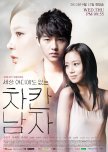
Let’s See How Many More Cliches We Can Cram In There..
Nice Guy (or “Innocent Man “depending on the translation ) is a revenge tale revolving around an innocent young man called Kang Ma-Roo ( Song Joong Ki) . After an unforgivable incident with his unrequited love interest Han Jae Hee ( Park Si Young), Kang Ma Roo’s life descends into bitterness and cynicism asa Casanova to pay for his sister-figure, Choco (Lee Yu Bi) ‘s medical bills and for a roof over their heads . A fated meeting with Jae Hee once again , leads him into hatching a revenge scheme by seducing Jae Hee’s cold-hearted stepdaughter and chaebol heiress ,Seo Eun Gi ( Moon Chae Won), however, revenge and love soon become intertwined as Ma-Roo finds himself falling deeper into an emotional whirlpool of the past and the present. Before I begin to analyse the reason behind my rating, I’ll start off by saying that this show could be surprisingly profound in parts . The drama exposed deeper levels of the characters’ consciences rather than a mere “ she’s the antagonist, so she is evil” and “ he’s the hero, so he’s always going to do the right thing”. In that respect, Kang Ma Roo is easily one of the most complex characters within the series; neither truly “ pure” and a knight in shining armour, nor beyond repair and a moustache twirling villain. Instead, he is simply human and is only trying to survive and receive justice for the wrongdoings of Han Jae Hee even if he has to harm others in the process. Similarly, it’s easy to write off Jae Hee as a “ femme fatale antagonist “ who is out to get Ma Roo , however, she does provide a similar reason behind her actions; survival. It doesn’t make her excuses forgivable, however, more profound moments in the series do reveal that Jae Hee has a family to look after, a status to maintain and feelings for Ma Roo which begin to bubble at the surface and drive her motivation out of revenge and jealousy. In a similar manner, Eun Gi is a spoilt and callous girl with few redeeming features, apart from a greater exposure beneath her facades towards having a good heart and her dedication to Ma Roo. Whilst the characterisation within the show is undeniably well-written, it’s hard to say the same about the general plot and the mixed bag of acting within the show as well. The early episodes within the show were simply nothing more than slow within the general pacing of the series. Whilst these episodes do set out the groundwork for the reason behind Ma Roo’s revenge and how he comes to meet Jae Hee again and Eun Gi, there’s little direction or premise towards exactly how the series will go. Once the pace does pick up after a couple of episodes into the drawn main premise of Eun Gi being in a manipulative relationship with Ma Roo, the scriptwriters go wild with cramming in as many cliches as they can into the storyline at once, rather than simply either only choosing a couple sensical cliches and developing the show with original takes, or not including them at all. Instead, we are left with the notable cliches which have been laughably performed in every known Korean drama before and afterwards, from suffering Male lead, rich female lead, Male lead will do anything to survive, illness, amnesia, heirs and fiancés just for good measure. Whilst the cliches in themselves can be done incredibly well, the show simply overdramatised many of these cliches into beyond ridiculous plot ventures later into the series especially regarding the clearly manipulative relationship which the writers try to pick up again through romanticism. Whilst this did expose a more emotionally vulnerable sides to Ma Roo and Eun Gi, it left out many inclusive details towards Ma Roo’s reasons for approaching Eun Gi in the first place. The ending of the show is more than a quick fix solution, than a cathartic completion for our protagonists and felt a slight let down in regards to the great potential which the scriptwriters could have played with after the final climax of the series. In terms of acting, the cast had certain moments of brilliance and laughable deliverance of lines as well. Song Joong Ki portrayed his role not so much through some of his mediocre deliverance of lines and angst brooding, but, through his usage of facial expressions in particular to express to the audience the emotional state of Kang Ma Roo was well -performed . In comparison to Chae Won, Si Young’s performance as Jae Hee , wasn’t enough for a standing ovation from her portrayal easily fading into the background, however, she did play the role with a level of some emotional complexity as a woman torn between survival and love in some of the more profound and touching rare moments especially between her son and surprisingly Eun Gi . Undeniably, Chae Won was one of the strongest actors within the show. Whilst like Joong Ki she had her wobbly moments, it was fair to say that her portrayal was played with a level of more than emotional complexity and humanity and quickly had audiences rooting for her by her expression of emotions.
Was this review helpful to you?
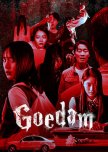
An Easily Forgettable Show...
A collection of short series revolving around the mysterious and unexplained, the show had undeniable potential to be an original and chilling ensemble of horror tales. Instead, we got Goedam. A show filled with repetitive storylines, gore horror cliches and lacking characterisation. To put in more simple words, Goedam is the sort of show which you can watch in a short space of time, and easily forget about anything in the show, the day afterwards.
Yes, I’m not forgetting that the episodes did average upon less than 10 mins in length. As a consequence ,it was clear from the -get go that the episodes weren’t going to be in -depth stories about the traumas of the human soul . There is still a lot a story writer can do , however, in a short drama regardless of genre ( whilst not a personal favourite , note Bing Goo, as an example of a “short drama” with a creative and controlled flare)
without falling short upon generic cliches and story archetypes as shown as Goedam.
For a horror drama, there was nothing which delivered a particularly spine-tingling aftermath for viewers. It became apparent that the show relied lethargically upon the gore and body horror trope for virtually every ending resulting in a death or a blood bath for the character/ victim of the episode. Besides only a couple of episodes scratching the surface of Asian horror, it would have been more entertaining as a viewer, to have seen a more episodes focusing upon elements of traditional Korean horror or at least varied tales, urban legends and creatures for a reflection of a more sinister and memorable Horror show.
Was this review helpful to you?

A Drama Which Certainly Doesn’t Disappear From Your Mind With The First Snow...
When skimming over reviews on this website for drama recommendations , I’m sure that most fellow drama watchers can agree that you should take what “ critics” sometimes say with a pinch of salt, especially when a drama gets 10/10 on all categories. Of course, it’s human nature that our tastes differ from one another. I’m sure most drama watchers have been in my shoes, where someone will blatantly say to you that “ this drama, is the best one in the world” , and when you come to watch it via their recommendations, you can’t get even get through the first ten minutes of it without internally screaming at the screen.Goblin is no exception . I remember the first time watching Goblin and as one of my first few Korean dramas , I was undeniably a biased fan. I denied a lot of evident faults which has arisen to my attention in the drama, because I had been enchanted from episode one by the show’s cinematography. ( As a fan of Ghibli Movies, the drama reminded me a lot of the detail behind characters and setting put into some of my personal favourites ) . For a long time, I remember maintaining this biased opinion upon Goblin , until, I gained a new perspective from a friend who had never watched Goblin ( though she had seen a lot of Korean dramas before) , and out of curiosity, I asked her to give her own honest feedback after watching it.
Her own thoughts on the drama ? She hated it with the passion. It surprised me a lot when she gave me her honest feedback on the show. We’d nearly always seen eye to eye on movies, shows and books, so, it was surprising that her opinion differed so greatly from my own. Out of curiosity, I asked her to elaborate on what annoyed her about it. Her list was certainly endless, but, it did help to bring to mind even at the time, the classic
Marmite slogan ; you either love it, or you hate it, and, Goblin is truly one of the two for drama fans .
I’ll be honest in saying that my thoughts on the show didn’t magically change overnight, however, my friend’s criticisms did make me rethink a lot about my biased views on the drama. As a consequence, I decided to rewatch it, and it was only through watching again without rose-tinted glasses, that I began to understand my original thoughts that I had buried down in place of my love for the drama, after watching the show again .
First off, I will agree with nearly all of the reviews, that Goblin is a fairly original drama . The blockbuster hit across Korea and overseas, does present a fascinating combination of Korean mythology in a modern day setting with intriguing characters, an unforgettable OST and of course beautiful backdrop settings as well. So, where can we find any faults, with it then?
First off, the episode lengths between 70-80 minutes. Of course, in comparison to some dramas, Goblin is about average for a Korean TV programme. It did come to my attention , however, that in a lot of drama reviews, few critics have actually bothered to mention simply slow- paced some episodes became when a “ short” storyline was paced for nearly three hours, rather than finished in one completed episode in order to progress the storyline . Arguably, the drama did use some of this time to establish some key techniques , not least introducing our protagonists and foreshadowing later events as well. On the other hand, it still remains prominent exactly how key writer Eun Sook and of course the cast, were able to truly establish our characters in this seemingly endless amount of hours as well.
Gong Yoo’s performance as Kim Shin, was fairly impressive. I’ll be honest in saying, Gong Yoo was not notably memorable in comparison to other performances that I’ve seen by actors, however, he still portrayed his role with a level of emotional appeal for viewers. Portraying a former general trapped in a cursed immortal body, I’m sure you can imagine the amount of raw appeal and questions of philosophy which were arisen by thoughts of immortality and morality within the show. On the other hand, it did come to my obvious attention watching the drama again ( and a shared criticism by my friend) , that Eun Sook had left out a lot of realistic qualities and characterisation techniques for Kim Shin. This is because Eun Sook had written not suggested any truly profound psychological or pondering qualities towards a man who has lived for nearly a millennium with “ no love interests”. Whilst I appreciate the romantic element of ‘ first love’ in the drama and of course concepts of chastity in Korean culture, it was beyond ridiculous for Eun Sook to even mildly hint that an adult man who had lived for centuries , had never had a one night stand nor interests in any woman before Eun Tak.
By far, Eun Sook did give Ji Eun Tak some story writing justice . This was explored brilliantly by Kim Go Eun taking upon a younger, yet arguably a more complex portrayal of an adolescent at the time and Eun Sook making
Eun Tak a more relatable and empathic character to audiences than Kim Shin . Sadly, this didn’t entirely mean that she was a more ‘ fleshed - out’ protagonist either. Whilst it was certainly a lot more believable upon Eun Tak’s passing fancies for Kim Shin and her old classmate, Eun Sook seemed to be focused a little too much upon Eun Tak as a ‘ younger schoolgirl ‘ for a major proportion of the drama, highlighting an unrealistic correlation between her naivety against her age, intelligence and circumstances shown within the show.
As a consequence, this does raise a lot of issues with the age difference between an emotionally vulnerable high schooler and an adult man as well. Am I being biased and arguing it would have been different if Kim Shin had been given to a “ young and fresher” actor like Sung Jae instead? No. The age gap is not actually the main problem, it seems. Whilst the issue of gaps certainly raised an eyebrow for me early on within the show, I can’t deny that the setup between the two characters does explore a maturation of different love forms between the two leads from friends to near family to a romantic setting in a somewhat gradual development for audiences. Where my criticism lies is certainly within the factor that neither leads are truly explored because of this age gap, as being realistic love interests for one another. There were no explorations of emotional trials, similar tastes or expanding their feelings realistically to one another at all within the show, even in the apparent emotional conclusion of the final episode.
Then of course aside from our main leads, there’s also the portrayals of the Grim Reaper (Dong Wook) , Sunny (Yoo In-Na ) and spoilt Chaebol heir Yoo Deok Hwa (Yook Sung Jae). With regards to his role as the Reaper , Dong Wook interestingly said in an interview once, his embarrassment at not living down his role in the show and it’s easy to see why . Dong Wook’s portrayal from the seemingly callous and sardonic figure to a soft-hearted soul, added to some more touching and humorous moments in a show centralised upon romance. Aside from his comically heart -driven romance with Sunny, the Reaper’s relationship with the Goblin was portrayed in brilliant fraternal-style for audiences which will easily make you laugh and your heart breaking within later scenes in the show. Although there was some out -of -place lines and cheesy acting moments, Eun Sook did undeniably do Dong Wook justice in this role, however, in a similar manner to Shin and Eun Tak, there was a lot of left out realism within the Reaper, especially psychologically.
It’s undeniable that Sunny and the Reaper’s relationship had a level of comical chemistry between essentially a naive man with lacking social interactions , and a social butterfly each seeking their own comfort within one another’s company. Yoo In-Na did give a genuine sense of authenticity within her portrayal as a healthy sister figure for Eun Tak as a character, something which thankfully didn’t drive downwards into the typical cliche of female animosity, however, in a slightly more honest manner, Yoo In-Na nor Eun Sook, truly add anything
jovially new to the cliche female flirt role of Sunny. Whilst she did play her role intriguingly later on within the show, for a high percentage of the drama, she was a perfect example of a ‘ stock female lead’; flirtatious , comical and a perfect plot device, but certainly not a sincere human being with with any exposure in flashbacks , relationships prior to any of the other protagonists or expressions of any sincere emotions.
In a similar manner whilst Yook Sung Jae doesn’t shine out as much as Go Eun or Dong Wook, his performance was still surprisingly well retained as the stereotypical “ spoilt heir” who shows a deeper side to his personality during the course of the show. My biggest complaint with Eun Sook’s characterisation of Deok Hwa was that there was a lot of brimmed potential with Sung Jae ‘s portrayal. Rather than giving Sung Jae any justice in a similar manner to In-Na, Sung Jae is left as the sort of stock ‘ clown character ‘ of the drama. What makes this even more ironic is that Eun Sook suggested later in the show a more complex and intriguing quality to Deok Hwa, which was unsurprisingly disregarded later that episode and once he had been of use to this particular storyline, Deok Hwa was nearly entirely disregarded as a character by the ending of episode 16.
In addition to this portrayal of characters and questionable storyline , there’s the other slightly more trivial complaint of excessive product placement. Whilst this doesn’t entirely take away from the originality of the plot, seeing a Subway or a placement for Paul’s Boutique in the middle of a scene which could have been used for original character progression and storyline considering Eun Sook’s missed links, did irk me a bit personally. Critically, I think it’s fair to say that I can only give you my personal thoughts on the drama. Goblin is one of those shows which you you sort of have to watch yourself to work out whether you love it or hate it. There will be some people who have entirely disagreed with everything that I’ve said in this review, and arguably some who have felt the same as well, and that, is perfectly entitled either way . Regardless of your thoughts on the matter, Goblin has strengths and faults for everyone, but it’s certainly a show you shouldn’t miss out upon as well.
Was this review helpful to you?
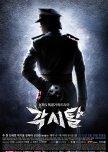
A Typical Historical Drama , With A Not So Typical Twist...
The beginning of the show sets the drama in 1930s Korea during the Japanese occupation . The Male lead, Lee Kang To, is one of the few Korean police officers in the Japanese force, a factor which shuns for not being Korean by his own people, and being an outsider by the Japanese. Kang To becomes determined to capture the Robin-Hood-style vigilante, Bridal Mask, and prove hinself to the police force. When Kang To discovers an ugly truth about the original person behind the mask, he begins to wear the identity of Bridal Mask in an attempt for vengeance against those who wronged him, a fate which drags in his old friend and former high school teacher, Kimura Shinji, and a mysterious Korean woman, Mok Dan, into the mix as well. Undeniably, after a slow start, the show after episode 3, kicked off to an intriguing plot regarding some in predictable moments for Kang To’s redemption.Even in the earlier episodes, the script writers were quick to draw the line that there was a more of a morally “ grey area” to Kang To’s character than everyone presumes as the “ enemy of the people”, none more shown in the relationship between himself and his brother.However, my one fault was that whilst Kang To began to fight for the “ good side”, there was little drawn by the resistance fighters towards some of Kang To’s more violent ideas and actions such as the suicide bomber at the police ceremony event . Undeniably this wasn’t viewed as a “ bad action” in the show by resistance fighters, however, there were some moves even when he became caught up in the cat and mouse game with Shinji, that seemed a little questioning towards the line between injuring and killing even some of his old friends in the academy, something which felt a little out of place considering Kang To’s emotions . Perhaps topping Kang To in characterisation, was Kimura Shinji’s transgression from an amiable schoolteacher to a near sociopath. Whilst there was an obvious drawn line between the “ good” hero of justice, Lee Kang To, and the “ villainous” Japanese officer, Kimura Shinji, there were moments within Shinii’s character,that spoke exposed a more “ human” side to an antagonist. In regards to our female character of the show, Mok Dan had realistic conflicted feelings to Kang To, a Japanese police officer, as well as her duty towards her father’s cause in the Japanese resistance movement. On the other hand, Mok Dan felt a little underdeveloped in terms of her general personality and persona than Kang To and Shinji. Whilst she did seem to have a moral compass, it was difficult to see exactly what made her relatable as an individual. Perhaps the one female character which the scriptwriters did seem to stick out more in terms of personality, was Ueno Rie’s desire for climb up to the top, as well her feelings for Kang To, yet, even then Ueno Rie felt a little more like a dead weight within moments in the drama . By the ending of the show, the script offers a strong hold upon the general objective towards Bridal Mask,however, there were a few technical trip-ups especially in regards to several of the resistance fighters being able to “ shake off” Japanese spies on more than one occasion. The final ending of the drama tied off some very loose ends in regards to the final chase with Bridal Mask and took some shocking decisions as well regarding some main character. Whilst I am conflicted towards the scriptwriters decision , it did deliver a more appropriate ending for an action drama than a lot of other Korean action dramas out there which would end the show upon an entirely idealistic ending than one appropriate for its genre.Was this review helpful to you?
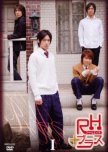
This review may contain spoilers
A Sugary Sweet Vampire Drama
RH Plus was a show filled with a level of sugar sweet high school tropes, which undeniably left more questions than answers by the ending of the drama. In the beginning of the drama, the show focuses upon Makoto moving into a new residence , revealing that everyone ( including himself ) are all secret vampires. Now, the one thing which I did always feel as though this show could’ve gone into more depth around is the existence of vampires outside of the mansion. Whilst the script writers did have the benefit of being able to focus upon the centralised lives of Makoto and the other residents, there were many elements from the pasts of the characters which felt disjointed within the show, particularly the secret revelation behind Makoto’s parentage and of course, the head, Kiyoi’s past as the oldest vampire well. The latter, ironically being a major part of the series, however, there was little reason or explanation as to why Makoto’s mother and father ended up together in the first place and of course, why both parents made their decisions in the plot as well which would of course influence Makoto’s mental state for a major proportion of the series. This leads us to the next biggest problem . The unanswered questions. Naturally, a show can go through never answering these questions for viewers, however, there was little actual indication towards a sense of emotional appeal or relatability with most of the characters. Not least is the parentage of Makoto never truly brought to light in the series or shown to actually affect Makoto after the revelation, but, there are also so many questions regarding Makoto ‘s abilities as well which didn’t feel disclosed for viewers. Similarly, it would have been just as intriguing to have known more about Kiyoi’s past especially his path to vampirism. This leads us to another big snag in the series. How are vampires created? Now, this more of a general nag than anything else, but it felt a little annoying as to the fact that none of the characters were exposed towards if they had been presumably human or vampires their entire lives. Presumably, they were human once from Kiyoi’s comments, however, this also would lead to the more moral questions such as the youngest Ageha, and how these characters dealt with the pain and heartbreak of having to leave their human lives behind, something which just was dealt with at all in a show about vampires.Was this review helpful to you?

This review may contain spoilers
A Time Travelling Pop Idol , That’s A New One, Korea...
Hit the Top was a strange mix of cliche and heartwarming plot to say the least. The beginning of the show was undeniably dragged out. Rather than simply introducing us to our main protagonists in addition to our main protagonist , Hyun Jae,time travelling escapade to 2017 and meeting the gang in maybe two episodes max, the show drags this on for more than three episodes. Like most drama scriptwriting, this does give viewers to see a little more upon the individual circumstances of both past and present versions before and after Hyun Jae’s mysterious death in 1994. The “younger” range of characters who Hyun Jae begins to live with , are Ji Hoon, the studious adopted son of Gwang Tae and the polar opposite of Hyun Jae, (however, he also aspires to be a popular idol, )Woo Seung, a young student desperate to pass her university exam and of course MC Drill, one of Hyun Jae’s best friends and trainees at the same entertainment company. The characters which have connections to Hyun Jae’s past, are probably the characters who go through the most development in the show. Hyun Jae’s former manager and friend, Gwang Tae, juggles between his feelings for Bo Hee , managing the dying company and of course trying to be a paternal figure to Ji Hoon. Bo Hee longs for her glory days but is a washed up star, seemingly narcissistic and less than a maternal figure to her son Ji Hoon, however, her character certainly goes through a lot of development in the course of the plot, most certainly finally letting go of her weighed up guilt to Hyun Jae’s death. Then of course, there’s Sundae. The chairman of one of Korea’s most successful groups, now similarly disregarded by his former contractee, Soon Tae’s growing idol business and battling old age. In terms of development, whilst the show did focus upon the main mystery upon Hyun Jae’s disappearance and to a lesser extent Ji Hoon’s twist parentage, a lot of the cushioned storyline such as the relationship between Woo Seung with Hyun Jae , diminished the focus upon familial relationships within the show. Whilst a lot of critics jump to point out the age difference officially between Woo Seung and Hyun Jae in 2017( I.e Hyun Jae is officially in his 40s and Woo Seung is still only in her 20s), my biggest problem did not come through this. ( Although a lot of critics also forget that Hyun Jae is from 1993, and consequently is still in his 20s.) It was not to do with the lack of chemistry between the leads, but, rather it diminished the main focus upon Hyun Jae’s familial relationships, as well of course trying to overcome the plot hole of the butterfly effect which just drags deeper downwards, near the ending of the show due to of course the error of one of the main plot reveals. Naturally, the ending did offer a happy release for viewers and tied down the fates of the characters , however, it didn’t truly feel connected together as a final and complete ending, considering that one of the main plot’s storylines was nearly erased entirely from its appeal.Was this review helpful to you?
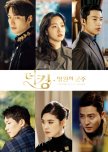
An “Eternally “ Forgettable Show
Kim Eun Sook has been an incredibly popular screenwriter over the years due to her past involvement in works such as ‘ Lovers In Paris’, ‘ Descendants Of The Sun’, ‘ The Heirs’, ‘ Goblin’ and ‘ Mr Sunshine’. Whilst admittedly the quality of her works have remained divisive amongst drama watchers and critics alike, it is almost guaranteed that Eun Sook’s dramas will generate a certain buzz and present a wide range of acting talents. Therefore when news was released that ‘ Eun Sook’s latest project would be bringing on a star-studded cast alongside an intriguing premise, it certainly seemed to suggest that ‘ Eternal Monarch’ would be a worthwhile watch. However, reality can often be disappointing and not even Lee Min Ho and Kim Go Eun could prevent the drama from descending into a cataclysmic spiral of mediocrity.
Undeniably, Eun Sook’s premise for the show had good potential upon paper. Parallel worlds, histories and doppelgängers can’t be claimed to be entirely brand new concepts within Korean dramas( note shows such as Duel , King of Two Hearts and W; Two Worlds for references ), however, the potential for a show in which one of Korea’s darker moments of history ( for those who don’t know , the 1910 Japan- Korea Annexation Treaty which played a part in ending the Korean monarchy , and the tragic Korean War of 1950-1953, which caused the divide of North and South Korea ) having never existed in one world with a still present Korean monarchy , did seem to suggest that King; Eternal Monarch could’ve been a generally enlightening and profound drama.
Sadly, Eun Sook wasn’t seeking to stimulate our brains with philosophical thoughts, centralising her efforts upon lacking “ cute” couple moments instead. It’s fair to say that Lee Min Ho and Kim Go Eun’s names as our leads within the show, offer a certain appeal for fans through memories of other stellar performances by the actors ( particularly Boys Over Flowers and Goblin) , however, Min Ho’s portrayal as Kim Gon sadly, was easily forgettable through his generic deliverance of lines and development as a character throughout the drama. Similarly, his costar Go Eun’s performance as detective Tae Eul/ her criminal counterpart , Luna, certainly wasn’t portrayed in an unbearable performance, however, her deliverance of lines preceding her reputation as a top -notch actress, was a mediocre performance to say the least ( equally parallel to her costar Eun Chae’s wobbly deliverance of lines in the drama )
. As for their characters, cynical cop and a smart King from a parallel world, isn’t something you see everyday, yet, for a show which centralises upon romance, there was nothing notably impressive within the build up of the two characters and their relationship. There were no moments of genuinely moving emotional trials , development , paced storyline or more importantly why either lead even decided to fall for one another at all. On a partial side note, the one joy which Eternal Monarch did bring for viewers was Woo Do Hwan’s comical portrayal as an easygoing intern at Tae Eul’s station and his counterpart , the cynical and confident bodyguard of Gon in his world.
On the other hand, whilst Do Hwan was possibly one of the few decent actors in the show, Eun Sook could have done a lot more with the storyline overall. If the show had focused less upon advertising the latest designer outfit on Min Ho as he swishes along the streets of Seoul in Tae Eul’s world , or a new chicken restaurant during a moment which could’ve been prevalent to the pacing of the storyline, then perhaps Eternal Monarch would’ve also offered us a greater explanation to exactly the unexplainable central reason behind the parallel universes , the intentions to exactly how two people can exist at the same time worlds apart in different dimensions or time zones ( note the whole unexplained reasons behind the boy with the yo-yo , the footage from the future and of course changing the timeline with Gon’s alternate self), and a well-written antagonist who didn’t fall short upon being simply a nefarious moustache twirling villain as well.
Was this review helpful to you?






















